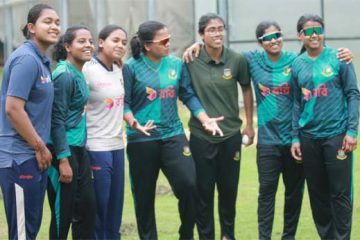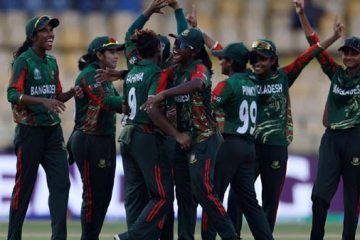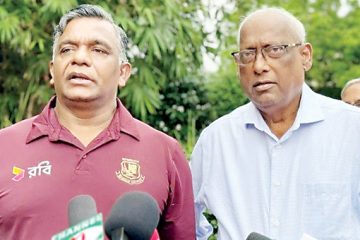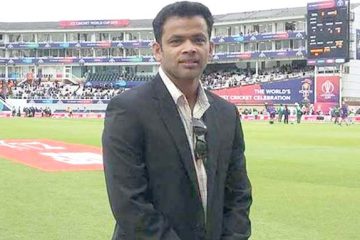For Mohammad Ashraful, the moment when everything started to change is very clearly etched in memory. It was a cool January day in 2009 at the Sher-e-Bangla National Stadium in Mirpur and Bangladesh was up in a tough match against the visiting Sri Lankan side.
Aided by two marvellous spells of fast bowling from Mashrafe bin Mortaza and the then upcoming Rubel Hossain, Bangladesh had skittled their illustrious neighbours for 147 in just over 30 overs. In reply however, the Tigers found themselves in a spot of bother after the loss of three quick wickets with just 11 on the board.
“Shakib [al Hasan] and I then joined in a partnership of nearly a hundred,” recalls Ashraful. “I made only 26 but I think at that time, it was an important innings, especially since Shakib went on to get 92 that day.”
The current Bangladesh captain was in imperious form, playing a swashbuckling innings on a pitch where every other batsman had struggled to impose themselves. Shakib’s 92 that day came off only 69 balls and propelled the team to victory and into the final of the tri-nation tournament also featuring Zimbabwe.
“During that game, I had a feeling that things were changing,” says Ashraful. “Previously we were happy just competing with the big teams, but that day there was a feeling prevalent that we will be able to beat the big teams if we played to our true potential,” he continues.
The feeling continued into the final which turned into a spell-binding encounter when Bangladesh almost defended a partly total of 152 with some spirited bowling and fielding. Shakib grabbed two wickets, Nazmul Hossain grabbed three and Mashrafe bowled ten overs for 18 as Bangladesh somehow grabbed defeat from the jaws of victory.
“Despite that loss, no one was crestfallen,” continues Ashraful. “These close games seemed an affirmation of our increase in quality more than anything else. It was the moment when I felt, we all truly started believing in ourselves,” says Ashraful.
For Ashraful though, that series was personally disappointing. Ever since he had hit the heights at the World Cup in the West Indies, Ashraful had struggled to cope with the burden of match-winning that had been his for too long over the last decade.
“But there were other match-winners coming through,” says Ashraful, referring to the likes of Tamim Iqbal and Shakib and harbouring no resentment at the loss of his elevated status in the team.
“Things are now very different to what it was in 2007. In that World Cup, we were hoping for an upset or two, but this time around we are firmly aiming for the quarterfinals. There is a significant change in the mentality.”
For Shakib though, everything is to be taken in stride.
“I don’t feel that there is anything special in terms of attitude. Ever since I have started playing cricket, I have always been playing to win. It is this mentality that I go out with every time I go out to play, against whichever opposition,” he says.
Shakib’s mark in Bangladesh’s rapid ascent since the 2007 World Cup is clear for all to see. The Tigers have registered 28 of their overall 64 victories in ODIs since the World Cup and some of those have come in comprehensive circumstances, like for example the series whitewash of New Zealand.
The writing is clearly on the wall. These new bunch of players know what it is to win. And no one can identify this better than Shahriar Nafees. The left-handed batsman had defected to the Indian Cricket League (ICL) in 2008 after a poor run of form and after only just returning to the side, is possibly the only ‘outsider’ in a World Cup squad that has largely been playing together for three to four years.
He then can clearly identify this new found confidence.
“I think confidence is everything,” says Nafees. “At the moment, the players are increasingly confident of achieving something. They know that at home we are considerably tough opposition and we can achieve good things with hard work.”
Nafees can also be considered a member of the old-guard having played under Habibul Bashar as well.
“It is like a relay race,” says Nafees. “[Habibul] Bashar and his team had bought the team to a certain level and Shakib is now carrying it on. We are moving forward, that is unquestionable,” says Nafees.
His words are vindicated with performances of the highest calibre in series wins at the Caribbean and the recent back-to-back series wins at home which have raised public interest to a crescendo.
But with increased expectations comes increased pressure. The World Cup at home is the sternest test of them all. How will Bangladesh stand up to this?
“People handle pressure in different ways; some thrive under it, some play their best when they don’t have it,” he says. “But there is a stern belief within this side because we are finally winning.”
A lot of this credit must go to Jamie Siddons as all readily admit, but it is an adage of ex-coach Dav Whatmore’s that comes to mind.
“Develop a winning habit,” he continually drilled into the players.
It seems that they finally have.




















